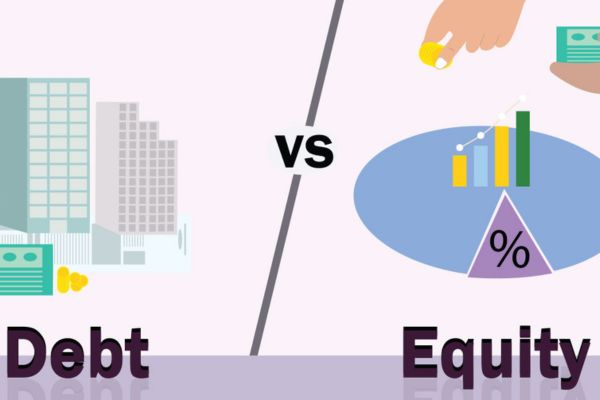
What is Debt Financing?
Debt financing is when you borrow money from a lender and agree to pay it back over a period of time along with interest.
Examples include taking out a mortgage to buy a house or a car loan. For businesses, common types of debt financing are term loans, , working capital financing and project financing and asset financing.
Some sources of debt financing are:
1. Term loans
2. Working Capital lines of credit
3. Invoice factoring
4. Leasing
5. Guarantees
What is Equity Financing?
Equity financing is when you raise money by selling shares of your business. These shares could be sold to investors, Private Equity firms, or the public.
Equity financing differs from debt financing in that it does not require regular repayments. However, opting for equity financing means you will have to give up a portion of ownership in your business. It can affect your control over decision-making and reduce the share of profits you receive as a business owner. However, it enhances governance and give the business a reference price.
Some sources of equity financing are:
1. Angel investors
2. Crowdfunding
3. Private Equity firms
4. Strategic investors
5. Listing on an exchange with an initial public offering (IPO)
Debt vs. Equity in Fundraising: Which One Should You Choose?
When it comes to fundraising, one of the biggest decisions a business owner faces is whether to choose equity or debt fund raising. Both options come with a set of advantages and risks, and the best choice depends on your business's specific needs, goals, and financial situation. Also, at what costs will the fund raising be depending on your cost of capital?
1. Income Generated:
The income your business generates plays a crucial role in determining whether equity or debt is the right path for fundraising. Lenders will examine your income to decide if you can repay the loan. If your business won't make enough money to cover the loan, private equity might be a better option. It's important to analyze your future income and choose the best financing option for raising the funds.
2. Ownership:
Debt is often a better choice than equity if you want to keep control of your business. With equity financing, you give up part of your ownership to investors. These investors will have a say in your business's daily operations. Lenders, on the other hand, won't get involved in managing your business. Once you pay off the loan, the lender relationship ends, but investors will continue to influence you unless they are bought out, the business is sold, or it goes public. How you finance your business can impact your independence and there is a trade off between control and enhancing the Governance at Board level
3. Financing Cost:
Whether you choose debt or equity, there is a cost to accessing funds. One advantage of debt financing is that interest payments are often tax-deductible. Even if interest rates rise, this benefit can lower your taxable income. However, debt must be repaid even if your business isn't profitable, which makes it less risky for lenders and more risky for business owners. With equity, investors only get paid if the company is profitable, meaning there's a higher risk that they won't get their expected returns. Debt financing generally costs less than equity financing but security must be provided. With Equity there is a burden sharing in terms of risk taking
4. Amount of Capital Needed:
The amount of capital you need also affects your choice. If you don't need a large amount, debt financing is often the best choice. But if you need much money, private investors might be a better option. Debt financing also tends to be faster than private equity.
5. Risks Involved:
Both debt and equity come with risks. With debt, you will need to make regular payments to the lender, which might include both principal and interest. If you can't make these payments, you risk losing assets or going into default. With equity, you could lose control of your business if you give away too much ownership. Equity investors can vote on important company decisions, and if you sell a large stake, they might try to influence your business in ways you don't agree with but it does enhance the Governance and add credibility to the business. Debt increases financial risk profile of the business and equity deleverages the financial risk.
6. Current Capital Structure:
While debt is cheaper, it comes with the risk of paying interest and timely repayment of principal. If you borrow too much, you might not be able to make payments, which could lead to an event of default. A company's capital structure is measured by the capital gearing ratio (debt to equity ratio). It's essential to keep this ratio at a healthy level.
Both debt and equity have their pros and cons. Private equity might be a good choice if your business is a startup since you might not meet a lender's requirements. It can also be useful for funding expansion. Plus, Private Equity ppyinvestors can help your business grow with their market experience. If your business is more established, debt financing might be the better option since you can meet the lender's requirements and keep control of your business. Be sure to consider all factors before deciding, and align your choice with your business goals and success.
What is the best option: Equity or Debt while raising funds for my business?
When raising funds for your business, one of the most important decisions you'll face is whether to go with equity or debt financing. Each option has its pros and cons, and the best choice depends on various factors related to your business's needs and goals. Here's a breakdown of what to consider:
1. What stage is your business at?
The stage of your business—whether you're just starting out or already in a growth phase—will influence the type of funding that suits you. Early-stage businesses may find equity funding more accessible, as investors are more willing to take on risk in exchange for ownership. On the other hand, if your business is more established, debt financing might be easier to secure, especially if you have a strong track record and assets to back the loan.
2.How much money do you need to raise?
The amount of capital you need plays a crucial role in your decision. Equity financing might be better if you're looking to raise a significant amount of capital and are willing to share ownership of the business. However, if you only need a smaller sum, debt financing might be more appropriate, as you can borrow the funds and retain full control of your company. Kick Advisory Services can assist you in determining the right amount to raise and guide you through the process of choosing between equity and debt financing. The valuation is key and more importantly whether fund raising will be a mix of sale and dilution. Professional advice is key in unlocking shareholder value.
3. How will you use the funds?
Understanding how you plan to use the funds is essential in determining which option works best. If you're looking to scale rapidly and need investors to help guide and mentor your business, equity might be the way to go. Conversely, if you're looking for funding to cover specific operational expenses or capital expenditures without giving up ownership, debt financing would be more suitable.
4. What type of lender do you want to work with?
Each lender or investor has a different approach and culture. With equity, you're not just looking for someone to provide capital but a partner who shares your vision for the business. It can be beneficial, especially if you're seeking guidance or strategic support. The role play at Board level will be enhanced Debt lenders, on the other hand, may have a more transactional relationship, focusing on repayment terms rather than long-term business growth.
Ultimately, the decision between equity and debt financing comes down to your business's specific needs, growth trajectory, and how much control you are willing to give up. Make sure to carefully evaluate your options and choose the one that aligns with your long-term goals. Kick is here to guide you through the process and help you make the right decision for your business.



















